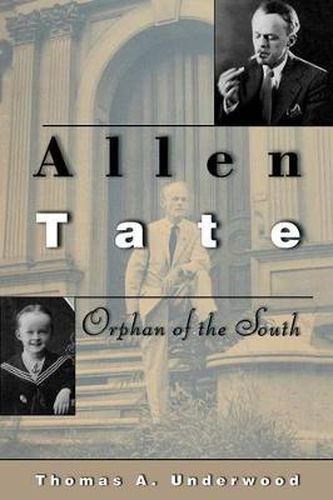Readings Newsletter
Become a Readings Member to make your shopping experience even easier.
Sign in or sign up for free!
You’re not far away from qualifying for FREE standard shipping within Australia
You’ve qualified for FREE standard shipping within Australia
The cart is loading…






Despite his celebrity and his fame, a series of literary feuds and the huge volume of sources have, until now, precluded a satisfying biography of Allen Tate. Anyone interested in the literature and history of the American South, or in modern letters, will be fascinated by his life. Poetry readers recognize Tate, whom T. S. Eliot once called the best poet writing in America, as the author of some of the twentieth century’s most powerful modernist verse. Others know him as a founder of The Fugitive , the first significant poetry journal to emerge from the South. Tate joined William Faulkner and others in launching what came to be known as the Southern Literary Renaissance. In 1930, he became a leader of the Southern Agrarian movement, perhaps America’s final potent critique of industrial capitalism. By 1938, Tate had departed politics and written The Fathers , a critically acclaimed novel about the dissolution of the antebellum South. He went on to earn almost every honor available to an American poet. His fatherly mentoring of younger poets, from Robert Penn Warren to Robert Lowell, and of southern novelists - including his first wife, Caroline Gordon - elicited as much rebellion as it did loyalty. Long-awaited and based on the author’s unprecedented access to Tate’s personal papers and surviving relatives, Orphan of the South brings Tate to 1938. It explores his attempt, first through politics and then through art, to reconcile his fierce talent and ambition with the painful history of his family and of the South. Tate was subjected to, and also perpetuated, fictional interpretations of his ancestry. He alternately abandoned and championed Southern culture. Viewing himself as an orphan from a region where family history is identity, he developed a curious blend of spiritual loneliness and ideological assuredness. His greatest challenge was transforming his troubled genealogy into a meaningful statement about himself and Southern culture as a whole. It was this problem that consumed Tate for the first half of his life, the years recorded here. This portrait of a man who both made and endured American literary history depicts the South through the story of one of its treasured, ambivalent, and sometimes wayward sons. Readers will gain a fertile understanding of the Southern upbringing, education, and literary battles that produced the brilliant poet who was Allen Tate.
$9.00 standard shipping within Australia
FREE standard shipping within Australia for orders over $100.00
Express & International shipping calculated at checkout
Despite his celebrity and his fame, a series of literary feuds and the huge volume of sources have, until now, precluded a satisfying biography of Allen Tate. Anyone interested in the literature and history of the American South, or in modern letters, will be fascinated by his life. Poetry readers recognize Tate, whom T. S. Eliot once called the best poet writing in America, as the author of some of the twentieth century’s most powerful modernist verse. Others know him as a founder of The Fugitive , the first significant poetry journal to emerge from the South. Tate joined William Faulkner and others in launching what came to be known as the Southern Literary Renaissance. In 1930, he became a leader of the Southern Agrarian movement, perhaps America’s final potent critique of industrial capitalism. By 1938, Tate had departed politics and written The Fathers , a critically acclaimed novel about the dissolution of the antebellum South. He went on to earn almost every honor available to an American poet. His fatherly mentoring of younger poets, from Robert Penn Warren to Robert Lowell, and of southern novelists - including his first wife, Caroline Gordon - elicited as much rebellion as it did loyalty. Long-awaited and based on the author’s unprecedented access to Tate’s personal papers and surviving relatives, Orphan of the South brings Tate to 1938. It explores his attempt, first through politics and then through art, to reconcile his fierce talent and ambition with the painful history of his family and of the South. Tate was subjected to, and also perpetuated, fictional interpretations of his ancestry. He alternately abandoned and championed Southern culture. Viewing himself as an orphan from a region where family history is identity, he developed a curious blend of spiritual loneliness and ideological assuredness. His greatest challenge was transforming his troubled genealogy into a meaningful statement about himself and Southern culture as a whole. It was this problem that consumed Tate for the first half of his life, the years recorded here. This portrait of a man who both made and endured American literary history depicts the South through the story of one of its treasured, ambivalent, and sometimes wayward sons. Readers will gain a fertile understanding of the Southern upbringing, education, and literary battles that produced the brilliant poet who was Allen Tate.